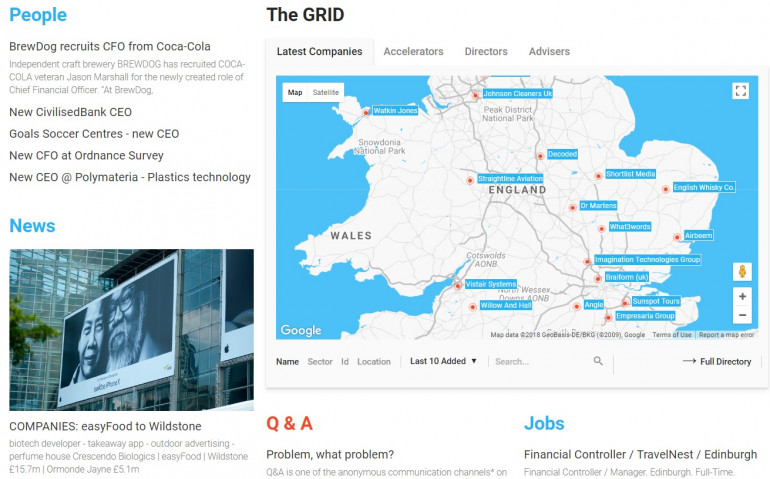Published by Directorzone Markets Ltd on December 22, 2016, 12:12 am in Knowledge, Other
Wednesday January 1st 2020

Mayor Funds Startups | Energy Wars | UK Export Blues | Self-Employed Tax Scrutiny | Single European Patent System | Business Wish List | CDC - Govt Overseas Private Equity | Space Investors | Iran Export Potential | EF London Accelerator Programme | Smart Cities | Google @ KX, London | Female Innovators £ | Foodtech | Business To Berlin? | Grandees Join Fintech | PE Deals Down | AI | Pitch@Palace | National Living Wage
Digest of news and trends in the GRID marketplace in November 2016:
MAYOR FUNDS STARTUPS
The London mayor's ploughed £2.5m into startups since Brexit | Lynsey Barber, City A.M. November 28
The Mayor of London has ploughed more than £2.5m into the capital's soon-to-be star startups since the vote for Brexit in a bid to show the world the city's "open for business", as he unveiled a new line up of advisors drawn from the UK's ranks of top entrepreneurs and business leaders.
Sadiq Khan hailed the LONDON CO-INVESTMENT FUND, which makes investments in early-stage tech, science and digital startups across the capital alongside private firms, as a boost for business in London.
The mayor is set to announce his 16-strong business advisory board on Monday morning which will guide City Hall on navigating the needs of business and push London's economy forward in the wake of the Brexit vote. The panel, whose members include 10 women and five from black, Asian and ethnic minority backgrounds (BAME), will meet with Khan and deputy mayor for Business Rajesh Agrawal at least four times a year.
Members / COMPANY:
- Omid Ashtari CITYMAPPER
- Inga Beale LLOYD’S OF LONDON
- Constantin Cotzias BLOOMBERG EUROPE
- Kym Denny VIVO
- Lloyd Dorfman TRAVELEX GROUP
- Jayne-Anne Gadhia VIRGIN MONEY
- Vivian Hunt MCKINSEY & COMPANY
- Shalini Khemka E2E
- Paul May PATISSERIE HOLDINGS
- Nicola Mendelsohn FACEBOOK
- Kathryn Parsons DECODED
- Nikhil Rath LONDON STOCK EXCHANGE
- William Sargent FRAMESTORE
- Laura Tenison JOJO MAMAN BÉBÉ
- Sarah Wood UNRULY
- Debbie Wosskow LOVE HOME SWAP
The most recent investment brings total funding in the two years since the scheme started to more than £11m for 67 businesses, with private sector cash alongside it bringing the total to £70m, and creating 450 jobs. The London Co-Investment Fund is the sixth most active venture capital investor in Europe since the start of 2015 in terms of the number of deals, according to data firm Pitchbook.
Since the EU referendum, 20 startups have landed funding from City Hall, which retains a stake in the businesses:
NAME Description / Investment
- VALLIE: A b2c app based car valet services £75,051
- MOM INCUBATORS: Portable incubators for premature babies £70,000
- REPOSIT (RARE MINDS): Insurance product to replace tenancy deposits £89,985
- HUBBLE (SPACIOUS): Market place for office rentals £258,655
- WEALTHKERNEL: Automated financial advice platform £100,000
- BEELINE (RELISH TECHNOLOGIES): Navigation system for bicycles £84,997
- TRUE AI: Automated customer services using AI £87,500
- PIVIGO: Big data science hub £100,000
- LIVE BETTER WITH: E-commerce firm for health and wellbeing £309,999
- ZERO HEIGHT: Large-scale collaborative development tool £100,000
- BRIDGEU CORPORATION: Careers management services for educational institutes £116,569
- MIAPPI: Social Media marketing firm £48,947
- JUPITER DIAGNOSTICS: Rapid blood testing platform £100,000
- HERESY SOFTWARE: Next generation CRM workflow solutions £150,000
- MOVIVO (BINOMIA); Mobile advertising and top-ups £89,999
- TRULY EXPERIENCES: E-commerce platform for experiences as gifts £125,000
- POWERVAULT: Smart energy company £80,000
ENERGY WARS
Upstarts taking on the big six energy suppliers are running out of steam | Danny Fortson, The Sunday Times. November 27
Since January, wholesale gas and electricity prices have jumped 35% and 40% respectively, reversing the trend of the past two years when they almost halved. That is a problem for the upstarts that have poached customers with cheap, long-term deals, but buy the energy to service them on a daily basis on the spot market. GB Energy Supply is the first domestic energy supplier to go out of business in a decade…
Greg Jackson, 45, is not concerned. He had no energy industry experience, yet he launched OCTOPUS ENERGY in April.
By the end of this year he reckons the company, based in Soho, central London, will have 50,000 customers — on the way to 1m by 2021. “There are two types of upstarts. Ones that are not well-financed, which in the face of rising prices are not going to survive,” Jackson said. “Then there are others that are going to change the world.”
UK EXPORT BLUES
Action! Brexit turns the spotlight on to exports | Kiki Loizou, The Sunday Times. November 27
..,only about 11% of registered British businesses currently export… Figures from the Office for National Statistics show that in the third quarter of this year Britain’s exports to the EU decreased by £100m and the trade deficit with the EU widened by £400m.
Research suggests that many companies keen to take the leap into exporting do not know where to start. Many more, however, are just not sufficiently excited by the prospect of sending goods or services overseas. They fear it will be too much hassle, cost too much and expose them to greater risks.
A survey of its members by the business network Enterprise Nation found that 76% of small firms do not export — and fully 80% of those said they had no interest in doing so.
The government recently launched its latest attempt to get businesses thinking about going farther afield. A new website, great.gov.uk, claims to steer companies towards suitable gaps in foreign markets. Ministers are hoping the free support will act as an incentive.
SELF-EMPLOYED TAX SCRUTINY
Tax system struggles to cope with rise of gig economy | Sarah O’Connor and Vanessa Houlder, FT. November 24
The number of people who work for themselves has increased 45 per cent since the turn of the millennium to 4.8m, or one in seven workers. The internet and, more recently, the growth of “gig economy” online platforms such as Uber and Deliveroo, have made it far easier for people to work in different ways.
But on Wednesday, chancellor Philip Hammond used his Autumn Statement to flag growing concern in government about this transformation of the workforce: the UK’s tax system has simply failed to keep up.
Traditional “employer-employee” relationships are taxed much more heavily than other work arrangements, such as being self-employed. Setting yourself up as a company can mean paying even less tax. The number of people who are sole directors of their own limited businesses has surged about 25 per cent between 2014 and 2015 alone.
The Office for Budget Responsibility said there were legitimate reasons for people to set up companies. But it also highlighted the big tax savings: switching to a corporate form could save employed and self-employed individuals £3,300 and £700 a year respectively, if they had incomes of £30,000 a year. The savings are set to increase — to £4,200 and £1,000 respectively — with the planned cut in the corporate tax rate to 17 per cent.
The OBR predicted incorporations would increase 5 per cent a year on average, much faster than the 0.4 per cent a year rise in total employment. It forecast this would cut tax revenues by £3.5bn in 2021-22, compared with a situation where incorporations increased in line with employment.
The tax savings mostly arise because less national insurance is paid on self-employment earnings, while none is paid on the dividends you would pay yourself if you set up a company.
Bill Dodwell, of professional services firm Deloitte, said the incentive for companies to save costs by moving people away from employed status was so great that the government would be forced to equalise tax rates for some groups. He said the tax bills of freelancers and fixed term contractors who worked for a single employer for more than a few months should be equalised with those of employees.
SINGLE EUROPEAN PATENT SYSTEM
Britain to ratify single European patent system | Clive Cookson, FT. November 28
Britain will ratify plans for a single European patent system, marking its first commitment to a new EU initiative since the Brexit referendum in June.
The system will enable companies to defend their rights with a single patent and a single legal system across the EU. At present patents have to be registered and enforced in individual countries. But patents will continue to be examined and granted by the European Patent Office, a non-EU international organisation in Munich.
The UNIFIED PATENT COURT (UPC) system, which combines elements of different European legal traditions and has been under intensive development for several years, will benefit not only British industry but also the London legal and IP professions. It could bring the British legal system as much as £200m worth of business a year, the UK IPO said.
Baroness Lucy Neville-Rolfe, intellectual property minister, said : 'We want to give British companies the maximum freedom to trade with and operate in the Single Market — and let European businesses do the same in the UK'
Although the EU is setting up the UPC, the court itself is not technically an EU institution but an international patent court with a judiciary including UK judges. However, the system in its present form is only open to EU member states.
Although Brexit uncertainty had delayed UK ratification and introduced uncertainty to the planning process, she hoped the UPC might begin work next April or May as originally planned. …although a six-month delay, with operations beginning at the end of 2017, was more likely.
Many IP lawyers and experts had expected the opposite outcome, with a decision to pull out of the UPC.
One of the most important branches of the new UPC is planned for London — ruling on patent disputes in pharmaceuticals and life sciences. The UK Intellectual Property Office has leased space for it in the new Aldgate Tower in the City.
BUSINESS WISH LIST
What businesses want from the Autumn Statement | Andy Bounds, Chris Tighe and Mure Dickie, FT. November 23
Industry hopes for action on tax breaks, overheads, stability, Brexit clarity and VAT. Alastair Bathgate, chief executive, BLUE PRISM, said:
• Tax breaks to encourage employees to take stakes in the company had helped attract good staff. He wanted them to continue or be extended. “Entrepreneurs’ relief is key. Every employee has some options or shares. If you are a high-growth business you have not got much cash. Stock is your currency to pay employees,” he said. Another scheme, Enterprise Management Incentives, allows the company to offer share discounts. You can buy shares of up to £250,000 without paying income tax or national insurance on the difference between what you pay for the shares and what they are worth.
• The business itself also uses the R&D; tax credit. “It’s very helpful in funding research. It pushed us into new territory.”
• Mr Bathgate also said the Enterprise Finance Guarantee scheme (EFG) was critical. Under it, the government underwrites part loans to small businesses, allowing banks to lend more cheaply. “It is very difficult for small tech companies to get bank finance because they have so few assets,” he said.
• Mr Bathgate said the government should spend more on transport connections between east and west. Living near Leeds, the 55-mile journey to the office takes at least two hours by car in rush hour and 90 minutes by train. “Forget HS2, it would be nice to be able to get over the Pennines,” he said.
• Broadband was more important than high-speed rail, he said. “I was delighted to see the government commitment to virtual infrastructure — 5G. This is really the sort of stuff we should aspire to and invest in.”
CDC - GOVT OVERSEAS PRIVATE EQUITY
UK eyes move to divert billions in aid to private equity arm | Henry Mance and Jim Pickard, FT. November 22
Priti Patel, the international development secretary who is a longstanding critic of aid, seeks to place more emphasis on the private sector at the expense of multilateral agencies. The Department for International Development is proposing to quadruple the limit on support the UK government can give to CDC GROUP, its overseas private equity arm, from £1.5bn to £6bn.
CDC’s existing limit of £1.5bn, which was set in 1999, was reached last year. The initial proposed increase of £4.5bn would be equivalent to one-tenth of the development budget over the remainder of the current parliament.
CDC, previously known as the Commonwealth Development Corporation, has been criticised for its executives’ expense claims on luxury hotels and restaurants and for its use of companies established in tax havens in order to make investments. Charities have linked its investments to environmental and labour violations in the Democratic Republic of Congo. CDC has said it is working to improve the situation.
Ministers have also been frustrated by CDC’s focus on safe, profitable investments — such as a Kenyan shopping mall — rather than taking risks in jurisdictions to which private funds are unwilling to commit. CDC’s chief executive changed in 2011; it has reported an annual return on net assets of 7.8 per cent during the past five years.
The group, which invests only in Africa and south Asia, received a boost last year when David Cameron’s government handed it an additional £735m — its first capital injection in 16 years.
The UK is the only member of the G7 to have met a UN commitment to spend 0.7 per cent of national income on overseas development. George Freeman, head of Theresa May’s policy unit, said last week that the aid budget could be used to ensure the spread of British scientific know-how to areas such as east Africa. Under British law, development spending must have the aim of reducing poverty.
SPACE INVESTORS
UK space fund set to boost rocketing sector | Peggy Hollinger FT. November 21
The launch of the £80m SERAPHIM SPACE FUND - the first venture capital fund dedicated to commercialising space - comes as the government prepares to publish figures that will show that growth in the UK space sector is outpacing the wider economy.
The government has set a tough target to win 10 per cent of the world’s estimated £400bn space market by 2030. The last figures compiled in 2014 showed the UK space sector generated revenues of close to £12bn a year.
The fund is launching a year later than planned amid uncertainty over the UK’s decision to quit the EU, but about £50m has now been committed in the first round of funding of which £30m is from the BRITISH BUSINESS BANK. A further £30m is being promised by the BBB and industry for the second round, due to close in April, and the first investments of £2m-£3m will be made in the new year.
Representatives from the corporate investors will sit on the fund’s investment advisory board and the European Space Agency will also have a seat.
Keith Morgan, chief executive of the BBB, said the UK would struggle to meet its targets without funds such as Seraphim.
Mark Boggett, chief executive of Seraphim, said his fund would work with another initiative that aims to expand the financing options for start-ups in the sector. A new group of space-focused “business angels” will be launched next month to focus on very early stage start-ups that need funding of up to £1m. Seraphim said it was already receiving at least 50 applications for funding a month and those that were promising but too early-stage for the fund would be passed to the UK Space Tech angels, being launched next month by the LONDON BUSINESS ANGEL NETWORK.
IRAN EXPORT POTENTIAL
All aboard for Liam Fox’s magic carpet ride to Tehran | Tommy Stubbington, The Sunday Times. November 20
With a GDP of almost $400bn (£320bn), Iran’s economy is the second-largest in the Middle East, boasting the second-largest gas reserves and fourth-largest oil reserves in the world. Liam Fox, the international trade secretary …. With a young, educated population of nearly 80m — and an investment-starved, mostly state-run economy — Iran is thought to be one of Fox’s more daring “golden” opportunities.
Iranian deals are back on the agenda following last year’s pact with the world’s six biggest economies designed to stop Tehran developing a nuclear weapons programme. A handful of big British businesses that fled Tehran after the fall of the Shah in 1979 are starting to move back:
- British Airways restarted direct flights to Tehran in September; no British airline had flown there in four years.
- Last month, Vodafone announced a partnership with an Iranian company to expand mobile internet services.
- BP, which can trace its roots back to the Anglo-Persian Oil Company that pioneered oil exploration in the country, took delivery this month of its first shipment of Iranian oil since sanctions were lifted.
“Iran has the possibility to be enormous,” said Gareth Jenkins, the boss of FSG TOOL & DIE, whose precision metal working equipment will soon be operating in the Zamzam cola plant in the Kurdish city of Kermanshah, in the mountains of western Iran. Jenkins reckons Iran could quickly become the biggest export market for the toolmaking company, which employs 100 people in Llantrisant, south Wales.
Tom Kirk, managing director of the Manchester engineering firm FRANCIS KIRK, also has a deal with Iran Khodro. His specialist screws and fasteners are used in the Iranian firm’s range of saloon cars. Having initially hoped to drum up another £5m of contracts on the trip, he now believes Francis Kirk can win up to £35m of new business in Iran over the next five years, potentially tripling the family-run company’s turnover.
BUT:
- For that success to be replicated for British industry as a whole, however, would take an improbable leap. Britain’s trade with Iran — our 97th-largest export destination — is minuscule, accounting for just 0.03% of exports…
- …. other European countries seem to have a sizeable head start on Britain in terms of Iranian trade. Germany’s manufacturing prowess means its exports to Iran are more than 20 times greater than Britain’s…
- … British executives warn that trading in Iran remains tough. Getting a visa can take months, and some travellers are warned by local contacts that their phones may be tapped while they are in the country.
- Banks are reluctant to revive links with Iran following a $9bn fine in America for French lender BNP Paribas in 2014 for violating sanctions.
- Countries such as China and India, which do not have free trade deals with the EU, could be much more meaningful growth areas if Brexit Britain can fast-track agreements to open up their markets. While those economies are much bigger, they are still a small part of Britain’s trade. Only 4.8% of Britain’s goods are exported to China, and 1.3% to India.
EF LONDON ACCELERATOR PROGRAMME
Meet the boffin who can bring a brainchild to life | Kiki Loizou, The Sunday Times
ENTREPRENEUR FIRST (EF), a London accelerator programme that helps top computer scientists to become businessmen and women. EF matches budding entrepreneurs with the skills to build a tech company, and then funds the idea they come up with. In this case, the investors look to back the brains rather than the brainchild. In five years, EF has funded about 100 start-ups with cheques of about £100,000 each.
Linda Wang, 25, who has a master’s in computer science from University College London, and Mihnea Spirescu, a Romanian tech entrepreneur and computer geek, 26, started work on LENDR, a venture that aims to use technology to transform the mortgage market. The founders have received more than £1,000 from EF so far and could get a further £90,000 over the six-month programme. They report once a week to their mentor, entrepreneur Wendy Tan White, and have her support for 18 months after the programme ends. For its money and expertise, EF takes 8% of Wang and Spirescu’s company.
Many of the techies behind the companies come from Britain’s top universities. By enlisting the brightest minds instead of judging applicants on business plans, EF has seen quick results. One of three “exits” so far to provide returns for the investors was artificial intelligence star Magic Pony, bought this year by Twitter for a reported $150m.
Alice Bentinck, 30, who co-founded EF with Matt Clifford…says things have changed since EF’s launch in 2011. “Over five years we have moved from taking on graduates to accepting any age and stage. We now have individuals joining us after 10 years in banking or working at tech giants such as Google or Microsoft.” Bentinck said EF entrepreneurs are not encouraged to seek out problems. “That often leads to them working on small, everyday issues in highly competitive spaces,” she said. “We encourage them to work on their ‘edge’ by using their skills to give them a competitive advantage.”
It was EF that turned Jamie Potter away from predictable ideas. Potter, 25, who studied mathematics and statistics at Oxford teamed with Dennis Xenos, 31, who has a PhD in chemical engineering from Imperial College London, to start FLEXCITON. Their business builds “intelligent software”, selling it to large companies to help them reduce operational costs and improve the efficiency of their machinery. Their time with EF finished in September. The co-founders are now in the process of raising £750,000 for Flexciton, having previously secured £80,000 through the programme. They are working with one other member of staff at offices near Old Street station in east London.
Chryssa Tsouraki, 30, who started SUITSME with co-founder Stelios Papagrigoriou signed up to EF in March. They have built a system that uses artificial intelligence to help retailers predict what consumers want. By understanding how a consumer shops online, a fashion business can target customers more effectively.
SMART CITIES
These 15 UK smart city startups are heading on a trade mission to Barcelona | Lynsey Barber, City A.M. November 14.
The market for smart cities is estimated to be worth £8bn by 2020, with around half of that coming from five particular sectors - energy, waste, water, transport and health - as the population of the capital rockets. Singapore, where the first ever driverless taxis took to the roads this summer, is a rival smart city hub while Barcelona ranks second to it according to analysts at Juniper Research. London is ranked third ahead of San Francisco and Oslo.
Some 15 of the top startups creating technology that seeks to make cities smarter and more connected, as well as solving problems such as pollution, population and transport, are heading to the Smart City Expo World Congress in the Spanish city with Sadiq Khan's deputy mayor for business Rajesh Agrawal this week:
- BlockDox
- Mastodon C
- NFC Ring
- Smart Energy GB
- Spacehive, a platform for civic crowdfunding projects focused on public spaces and the built environment
- WiFi Spark
- Design for Social Change
- GeoUniq
- Gett, Uber-rival in which German carmaker Volkswagen ploughed $300m (£239m) into earlier this year
- JustPark, parking app
- Invotra
- Open energi
- Polysolar, solar technology maker
- SEaB Energy
- Space Synthax
GOOGLE @ KX, LONDON
Google to create new London headquarters and 3,000 jobs at King's Cross | Tom Powell, Evening Standard.
Google has confirmed plans to expand its London headquarters at King’s Cross and create 3,000 new jobs in the capital. The firm's chief executive, Sundar Pichai announced plans to build a 10-storey, 650,000 square foot complex alongside its new offices in Pancras Square. ….be the first wholly owned and designed Google building outside of the US. It is believed the project will cost in excess of £1 billion.
In June, 2,500 employees began moving into the firm's new King's Cross offices, its largest in Europe.
FEMALE INNOVATORS £
£50,000 a head for female entrepreneurs | The Sunday Times November 13
The government will put £750,000 of state cash behind female entrepreneurs this week, after its research showed that women make up fewer than a 10th of the nation’s inventors. INNOVATE UK will award 15 female innovators grants of £50,000 through its new Women in Innovation programme. A further 19 will be placed on a support programme, offering mentoring from successful business people. Research from the UK’s Intellectual Property Office shows that just 7% of patents applications were registered by women.
FOODTECH
Food start-ups need the right ingredients | Emma Broomfield, The Sunday Times. November 13.
Government figures show there are about 6,400 micro, small and medium-sized enterprises in the sector. Yet while they account for 94% of the total number, they generate less than a quarter of the £95.4bn sales.
Last month the government launched the Food Innovation Network, which promises to give businesses access to test kitchens and laboratories to help them develop new products. They can also receive advice via an online portal. The aim is to encourage food exports, which have doubled over the past 10 years, and help brands cash in on the buying power of countries such as the United Arab Emirates, which imports 80% of its food and drink.
Twenty-seven of the businesses in this year’s Sunday Times International Track 200, which ranks mid-market companies with the fastest-growing worldwide sales, are in the food and drink industry. Getting young ventures to the level where they are ready for overseas growth comes with many pitfalls, however. Experts say entrepreneurs often develop a product without considering the extensive regulations on selling food and drink to the public.
BREAD & BUTTER, this weekend’s festival for food start-ups, aims to connect foodie entrepreneurs with buyers and industry bigwigs. Jason Gibb, 44, co-founder …, spent 10 years producing olive oil in Italy — and “made every mistake in the book”. He estimates that up to 90% of emerging brands fail to get past the first year of trading. Gibb is determined to pass on what he learnt to those starting out or scaling up their ventures. With this in mind he and co-founder Tara Mei have filled their two-day event in London with successful entrepreneurs and executives who will scrutinise everything from taste to packaging.
The festival takes place at the Institute of Directors on Pall Mall. Among the experts hearing pitches will be two senior buyers from Whole Foods Market. The Texas-based chain has nine shops in Britain so far. Its local producer loan programme offers start-ups up to £20,000 at an interest rate of about 5%.
One of the most anticipated initiatives is the Just Eat accelerator programme, which starts tomorrow. Five start-ups have been selected from several hundred applicants for the first of the 10-week mentoring courses.
JUST EAT, the online food order and delivery pioneer, launched in 2006 and now has annual sales of £247.6m. It is looking for start-ups that combine food and technology. Participants receive £20,000 funding in return for a 5% stake in their business. The first company selected for the programme was CITYMUNCH, an app that helps restaurants fill empty tables. If business is slow, they can immediately post special offers to bring in diners. Rob Lynch, 33, who launched the app in February, has signed up more than 250 restaurants and 9,000 users. …also …SHAREDINING, which allows kitchen owners to rent out spare space for extra cash.
BUSINESS TO BERLIN?
Berlin claims post-Brexit success in luring start-ups |Guy Chazan, FT. November 9
Germany is claiming the first successes in its campaign to entice start-ups worried about Brexit from London’s Silicon Roundabout to the tech incubators and accelerators of Berlin. Since the EU referendum in June, five London-based companies have moved to the German capital and a further 39 are seriously thinking about relocating, according to city officials.
… the defectors are small outfits with few employees, at the very earliest stage of their development. But the government is confident they are the harbingers of a bigger wave that could turn Berlin into Europe’s start-up capital.
Among those moving are
- MBJ, a web design firm;
- SWISSBANK, a fintech start-up;
- BRICKVEST, a property investment platform and
- KONETIK, a vehicle-tracking app.
Julian Baladurage, co-founder of MBJ, said he was motivated by fear that a British exit from the EU would limit the company’s ability to hire international talent.
Berlin still has a long way to go to rival London as a big tech hub. … venture capital deals … according to EY just €520m was invested in the city’s start-up scene over the period, compared with €1.3bn in London, €1bn in Stockholm and €673m in Paris.
Berlin … scene has become much more diversified in recent years, with dozens of new companies engaged in everything from fintech and software-as-a-service to the internet of Things.
Cheapness is perhaps the biggest draw. Stefan Franzke, head of Berlin Partner, an agency that promotes investment in the city ...says a Berlin start-up with 10 employees typically has costs of between €1m to €1.5m a year compared with €5m to €8m in London and about €10m in New York.
Start-ups can also count on financial support from the authorities, which provide grants to cover half the wages of new hires over a 12-month period through the Investitionsbank Berlin, a business development bank.
Help with overcoming bureaucracy is also available. Mr Franzke’s agency runs a business immigration service that can procure visas and work permits for tech immigrants within five days. It also provides advice on finding office space, hiring staff and raising funds.
Berlin Partner also offers to connect fintechs with established banks, and IoT start-ups with industrial companies, such as Bosch, that have opened innovation labs in Berlin.
Raashi Khanduri is one of those who have made the leap. A former oil industry engineer, she is the founder of LYTBULB, a cloud-based communication tool created in London in 2013, whose adopters include Worley Parsons, the Australian engineering group. She recently quit the UK to set up shop in the Factory, a Berlin co-working space that describes itself as Germany’s largest start-up campus. …was drawn to the abundance of big industrial customers in Germany that are looking to digitise their operations, as well as by Berlin’s “open-minded, less established culture”.
In other, crucial, ways though, Berlin still does not quite measure up to London. Thomas Schneider, founder of Brickvest, says the FCA, the UK financial watchdog, is way ahead of its German equivalent BaFin in its approach to fintech.
REVOLUT, a payments app, is considering moving its headquarters to Lithuania: the country’s central bank has said it will support its application for a banking licence that could be passported to the rest of Europe.
GRANDEES JOIN FINTECH
IG Group boss joins fintech startup board | Lynsey Barber, City A.M. November 7.
Ian Peacock, head of UK and Ireland at spreadbetter IG Group, the FTSE 250 firm, will join the advisory board of COINVESTOR – an alternative investment platform which allows private investors to put money into the same investment deals alongside fund managers. Peacock's appointment is just the latest example of a top Square Mile executive joining a new fintech company:
- City heavyweight Lady Barbara Judge joined startup HIBOB as chairman over the summer, while
- Blockchain startup SETL boasts former Barclays chair Sir David Walker, former Bank of England deputy governor Rachel Lomax and ex-Ofcom boss Ed Richards among its executive team.
- Rich Ricci, another top ex-banking executive at Barclays, joined fintech startup FREEMARKETFX as chairman earlier this year while
- Lord Adair Turner, the former chief of the finance regulator, joined the board of challenger bank OAKNORTH last year.
PE DEALS DOWN
Private equity pans for gold outside the south-east | Andy Bounds, FT. November 7
The third quarter of this year was the third consecutive quarter of decline in deal numbers for private company equity fundraisings, which dropped “alarmingly” by 16 per cent to 249 – according to consultancy Beauhurst. Investment amounts grew by 5 per cent, from £775m to £817m. But that was boosted by takeaway delivery app Deliveroo securing £210m.
Deal numbers for early stage companies fell more, by 20 per cent, (compared with 13 per cent for venture-stage and 14 per cent for growth-stage).
Private equity and venture capital deal numbers fell by 10 per cent across the board. Most regions saw a decrease in deal numbers, except for the East Midlands and north-east, where they increased from three to seven and six to 12 respectively.
That might explain the move for private equity groups to look beyond their traditional heartlands in London and the south-east. LDC, part of Lloyds Bank, is the only traditional VC house to have kept a comprehensive regional network. The BUSINESS GROWTH FUND, set up in 2011 by five big banks, has recently built one.
There are about 35 funds with a physical presence across the midlands and north. And they are getting bigger.
- Northedge, founded in 2013, raised a £300m fund in March, most from overseas investors.
- Manchester-based Palatine raised £220m in June last year
- Leeds-based Endless raised £525m, 80 per cent from overseas.
- There were 90 private equity deals worth £5.8bn in the north and midlands last year, compared with 63 worth £4.4bn in 2013, according to industry statistics.
…a report commissioned by the British Private Equity & Venture Capital Association, Deloitte and Northedge found that private equity ownership could have a bigger impact on midsized businesses in the regions. The report from Leeds University and Imperial College said that PE businesses on average increased sales by 5 per cent, exports by 9 per cent and staff numbers by 3 per cent annually across an 18 year period from 1998-2013. The report’s authors, Nick Wilson and Mike Wright, said that the north and midlands have fewer PE-owned businesses. They identified 1,187 companies that fit the target profile for PE, of which only 654 are in PE ownership.
AI
A new generation puts a commercial spin on work by codebreaker Alan Turing | Kiki Loizou, The Sunday Times
Artificial intelligence: algorithms that come close to replicating the human mind when tackling tasks from facial recognition to predicting what online shoppers want to buy next before they know it themselves.
Five British AI start-ups have been bought by giants of the tech world over the past four years. DEEPMIND, whose systems learn how to play computer games like a human being, was acquired by Google for £400m two years ago. In February, SWIFTKEY, which works on , was bought by Microsoft for more than £200m. More recently, Twitter snapped up the video-picture- enhancing venture MAGIC PONY for £122m.
Thanks to the plethora of ideas spilling out of an elite group of universities, at least four more businesses are thought to be on the radar of American predators.
Mike Lynch is one of the angel investors looking to bankroll Britain’s best coders. The founder of Autonomy, the software developer bought by Hewlett-Packard for £7.1bn in 2011, is finding no shortage of places to invest the $1bn (£800m) fund he has created, INVOKE CAPITAL. … said Lynch, of Britain’s ranking in AI innovation. “It’s the combination of a very strong academic scene and a new culture of applying this sort of tech to commercial businesses.”
He could be partly responsible for that boom, particularly in Cambridge, where Autonomy was founded. Since he sold his “big data” brainchild, more techies have turned a hand to ventures that have AI at their core. They teach computer systems to crunch data and learn from experience, understand information and respond to it in the same way as a human being.
Many of those at the helm of AI ventures have hired former Autonomy staff, arguably some of the country’s top software engineers. “Companies such as Autonomy and ARM trained a lot of people. We are starting to get that virtuous circle going in the UK” said Lynch, 51.
ARM, which makes chips for the iPhone, was recently sold to SoftBank of Japan for £24bn. Lynch is confident that the Japanese will make good on promises to hire more staff in Britain. If they don’t, he added, “you’re just going to have a whole load of incredibly talented people out there to help AI start-ups become very big companies”.
Lynch traces Britain’s AI history back to the late 1940s, and work that began when wartime codebreaker Alan Turing moved from Bletchley Park to Manchester University. It was only after America started outspending Britain in the 1950s, because of the onset of the Cold War, that organisations including Massachusetts Institute of Technology (MIT) started to gain an edge — with luminaries such as Noam Chomsky pioneering “machine learning” systems.
Today, Oxford University, Imperial College London and University College London are among the global leaders in the field. “What’s going on here in Britain is very impressive,” said Brian Forde, director of digital currency at MIT Media Lab and a former adviser to President Barack Obama. “You have some of the top universities in the world producing some of the smartest minds in one of the most important fields of the future.”
PITCH@PALACE
Duke of York makes technology funding event global | Madhumita Murgia, FT. November 3.
Prince Andrew, The Duke of York has become an unlikely success in the technology sector and now plans to open his Pitch@Palace start-up event to global firms.
… his biannual start-up event, which links British technology firms with investors, has helped raise funds for hundreds of start-ups since 2014 and seen at least two notable exits — voice recognition AI start-up VOCALIQ, which was acquired by Apple last year, and video analytics start-up MAGIC PONY, which Twitter bought earlier this year for $150m.
Healthcare start-up DOCTIFY, which won third place at the competition earlier this year, recently raised a seven-figure Series A round led by Amadeus Capital and others.
Prince Andrew will in December host companies at St James’s Palace from half-a-dozen foreign countries, including Mexico and Malaysia, followed next year by firms from China, Australia and the Middle East. His primary motivation in taking the competition international now is to help “plug weaknesses” in economies crippled by today’s macro uncertainties.
David Rowan, editor of Wired, the technology publication who also comperes for the Pitch@Palace, said the event draws “everyone from the mainstream tech VCs to real estate people to private wealthy individuals, to CEOs of big companies and celebrities”.
On Wednesday, the latest instalment will include 12 pitches for products ranging from sleep-inducing apps, to smart billboards and algorithms to safely guide drones through cities.
NATIONAL LIVING WAGE
London living wage increased to £9.75 an hour | Sarah O'Connor, FT. November 1.
Almost 3,000 employers - employing roughly 120,000 low-paid workers between them - will pay their workers a minimum of £8.45 an hour or £9.75 in London after an increase in voluntary living wage rates was announced on Monday. The Living Wage Foundation, which grew out of a campaign started in 2001 by community group Citizens UK, sets new rates each year that aim to reflect the wage someone needs to sustain a decent quality of life.
The London and non-London living wages have increased 3.7 and 2.4 per cent respectively since last year. As a result, a full-time worker on the living wage will earn £45 a week more than one on the government minimum; £95 a week more in London.
Some campaigners feared the living wage had been dealt an existential blow last year. George Osborne, then the chancellor, borrowed its popular brand to name his new minimum wage of £7.20 an hour the national living wage. This caused widespread confusion and prompted some campaigners to worry that employers would no longer bother to sign up for the voluntary higher rate.
But Gavin Kelly, chairman of the Living Wage Commission, which oversees the calculation of the voluntary rates, said the gloom had been misplaced. The number of employers signing up has doubled since Mr Osborne’s announcement.
… the British Library, which is the latest London employer to sign up. New members include employers with lower-paid workforces such as Curzon Cinemas and the retailers Oliver Bonas and Ikea.








